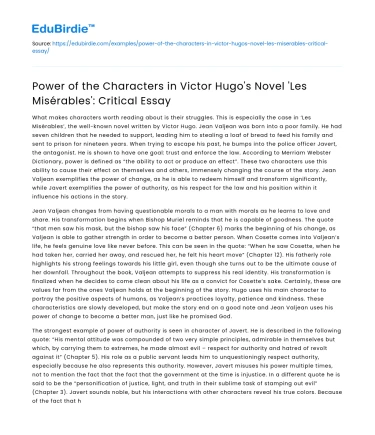What makes characters worth reading about is their struggles. This is especially the case in ‘Les Misérables’, the well-known novel written by Victor Hugo. Jean Valjean was born into a poor family. He had seven children that he needed to support, leading him to stealing a loaf of bread to feed his family and sent to prison for nineteen years. When trying to escape his past, he bumps into the police officer Javert, the antagonist. He is shown to have one goal: trust and enforce the law. According to Merriam Webster Dictionary, power is defined as “the ability to act or produce an effect”. These two characters use this ability to cause their effect on themselves and others, immensely changing the course of the story. Jean Valjean exemplifies the power of change, as he is able to redeem himself and transform significantly, while Javert exemplifies the power of authority, as his respect for the law and his position within it influence his actions in the story.
Jean Valjean changes from having questionable morals to a man with morals as he learns to love and share. His transformation begins when Bishop Muriel reminds that he is capable of goodness. The quote “that men saw his mask, but the bishop saw his face” (Chapter 6) marks the beginning of his change, as Valjean is able to gather strength in order to become a better person. When Cosette comes into Valjean’s life, he feels genuine love like never before. This can be seen in the quote: “When he saw Cosette, when he had taken her, carried her away, and rescued her, he felt his heart move” (Chapter 12). His fatherly role highlights his strong feelings towards his little girl, even though she turns out to be the ultimate cause of her downfall. Throughout the book, Valjean attempts to suppress his real identity. His transformation is finalized when he decides to come clean about his life as a convict for Cosette’s sake. Certainly, these are values far from the ones Valjean holds at the beginning of the story. Hugo uses his main character to portray the positive aspects of humans, as Valjean’s practices loyalty, patience and kindness. These characteristics are slowly developed, but make the story end on a good note and Jean Valjean uses his power of change to become a better man, just like he promised God.
The strongest example of power of authority is seen in character of Javert. He is described in the following quote: “His mental attitude was compounded of two very simple principles, admirable in themselves but which, by carrying them to extremes, he made almost evil – respect for authority and hatred of revolt against it” (Chapter 5). His role as a public servant leads him to unquestioningly respect authority, especially because he also represents this authority. However, Javert misuses his power multiple times, not to mention the fact that the fact that the government at the time is injustice. In a different quote he is said to be the “personification of justice, light, and truth in their sublime task of stamping out evil” (Chapter 3). Javert sounds noble, but his interactions with other characters reveal his true colors. Because of the fact that he does not tolerate rule breakers, Javert shows no sympathy, even if others are in desperate need of it. When he sentences Fantine, he is destroying her life, but in his eyes, she should be punished for breaking the law, no matter the circumstances. “You're getting six months” (Chapter 13), Javert didn’t think twice about this decision, his power given by the authority, and if you ask him, others need to abide by it.
Jean Valjean is able to change by helping those who are powerless, while Javert imposes his beliefs onto the rest of the characters with his determination to serve the law. Both of these men are powerful in their own ways. Hugo incorporates the theme of power seamlessly, creating an entertaining, heart-warming story that into ‘Les Misérables’.






 Stuck on your essay?
Stuck on your essay?

